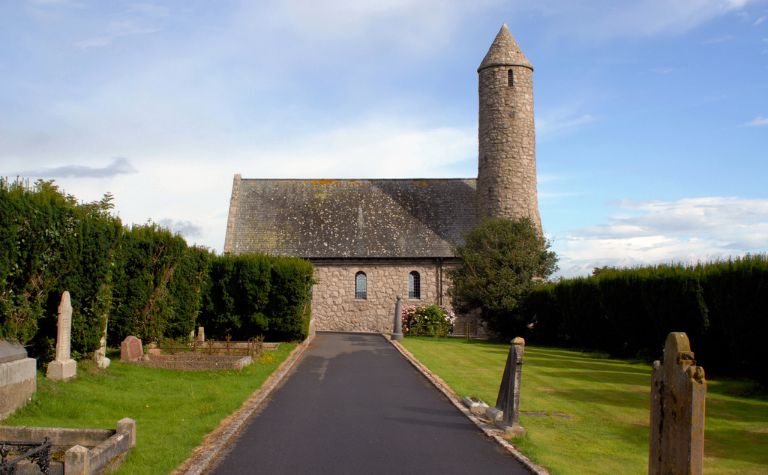Many people know that the terms “Episcopal” and “evangelical” are related to Christianity, but they aren’t sure how. The words look and sound partially the same, which is confusing for some. Because both terms are connected to the Christian faith, they have overlapping meanings. But there are important differences, too.
The term Episcopalian describes the American-born denomination that is part of the worldwide Anglican Communion, rooted in England. “Evangelical” describes a theologically conservative gospel-centered Protestant movement that gained momentum in the 20th century that has convictions to impact society and culture.
What do the terms “Episcopal” and “evangelical” mean exactly? How do their origins, practices, and worldview compare? What does each believe about the Bible, the Trinity, and the person and work of Jesus Christ? Keep reading to learn the answers to these questions and others.
Also, see Episcopalian vs. Baptist: What’s the Difference? to learn more.

Episcopal and Evangelical Christianity: Comparison
Evangelicalism grew to new heights in the 20th century. It separated from the fundamentalist movement, especially in regard to social engagement.
While evangelicalism and fundamentalism had similar theological beliefs, like the inspiration of Scripture and the doctrine of the Trinity, they had different convictions about social engagement.
Fundamentalism advocated separation from culture. Evangelicalism advocated engagement with culture.
| Episcopalian | Evangelical | |
|---|---|---|
| Name | From the Greek word for “overseer” and the Latin word for “bishop,” the term refers to a form of church government that locates ecclesiastical authority in the office of bishop as opposed to the papacy or congregational membership. The term also describes the largest tradition in the Anglican communion in America. | The word “evangelical” comes from the Greek word euangelion meaning gospel or good news. The term describes a gospel-centered or cross-centered worldview. |
| Origin | The Anglican tradition dates to the time of King Henry VIII (1491-1547) and his protests against the Catholic church. Anglicanism arrived in America as settlers arrived from England. The label “Episcopal” dates to the time of the Revolutionary War (1775-1783) when “Anglican” and “Church of England” were significantly out of favor in America. | The modern use of the term originated in the 20th century. It’s distinguished from liberal and fundamentalist movements. Fundamentalism has a similar theology to evangelicalism. |
| Branch of Christianity | Because its part of the Anglican Communion, many people consider Episcopalianism halfway between Protestantism and Catholicism. Many theologians and historians posit that a church can’t be “halfway Catholic,” so it’s best to consider the tradition Protestant with aspects of Catholicism woven into certain churches. | Evangelicalism mostly exists in Protestant churches. The movement resists efforts in many mainline churches to adopt liberal theological and social beliefs and practices. A non-Protestant church could be called “evangelical” if it shared the theology and practices of the movement. |
| Early contributors | King Edward VI (1537-1553), Queen Elizabeth I (1533-1603), theologian Richard Hooker (1554-1600) | English preacher Charles Spurgeon (1834-1892), American preacher Dwight L. Moody (1837-1899) |
| Episcopalian | Evangelical | |
|---|---|---|
| Organization | The word “episcopal” comes from the Greek word for “overseer” and the Latin word for “bishop.” It refers to a form of church government that locates ecclesiastical authority in the office of bishop, as opposed to the papacy, like in Catholicism, or the congregation, like in some Protestant traditions. | Churches in any denomination can be called “evangelical” if they centralize the gospel and emphasize other characteristics of the movement, such as valuing conversions and applying their faith to social causes like caring for the poor, widows, and orphans. |
| Authority | Historically, Episcopalianism, like the Anglican communion, values the Bible. The tradition affirms the Apostles’ Creed and the Nicene Creed. The Book of Common Prayer is also a pivotal document to the heart and identity of the tradition. | The Bible is the only authority for evangelicals. For many people, it is “inerrant” (without error) and “infallible” (unable to err or lead readers astray). |
| Divisions | The denomination called the “Episcopal Church” is the largest by a significant margin. Denominations and churches have split over theological, political, and social issues. Examples of contentious topics include women in ministry, allegations of devaluing Scripture, and issues related to same-sex marriage and gender identification. | Evangelicalism isn’t a denomination but a movement consisting of numerous denominations and even non-denominational churches. Evangelical churches can have congregational, presbyterian, or episcopalian church governments. |
| Social worldview today | The “Episcopal Church,” the largest communion in America, is socially and theologically liberal. | Historically, evangelical churches have been conservative theologically and socially; in recent years, some self-identifying evangelical churches have drifted from conservative theology and adopted modern social values on a variety of issues. |
The Episcopalian tradition in America has different expressions in twenty-first-century America. The denomination called the “Episcopal Church” is the largest by a significant margin.
Denominations and churches have split over theological, political, and social issues. Examples of contentious topics include women in ministry, allegations of devaluing Scripture, and issues related to same-sex marriage and gender identification.
| Episcopal Denominations | Reported Membership |
|---|---|
| Episcopal Church | 2 million |
| Anglican Church in North America | 112,000 |
| Continuing Anglican Churches | 100,000 |
| Reformed Episcopal Church | 15,000 |
Also, see Episcopalian vs. Non-Denominational: What’s the Difference? to learn more.

Episcopal and Evangelical Churches: Similarities and Differences
What are the “high church” and “low church” Anglicanism and Episcopalianism? The high church wing emphasizes the tradition’s similarities to Catholicism and practices aspects of High Mass. The low church wing emphasizes the tradition’s similarities with Protestantism and its roots in the Reformation.
- Today, some Episcopalian congregations in America emphasize beliefs and practices that are considered Catholic.
- Other churches are aligned with conservative evangelical theology, some of which embrace charismatic expressions of worship and prayer.
- Still, other Episcopal churches have largely abandoned historical Catholicism and Protestantism and have adopted liberal and progressive social-political convictions and have less theological focus.
| Episcopalian | Evangelical | |
|---|---|---|
| View of the Bible | Traditionally, the “low church” has a high view of Scripture, in alignment with Protestantism. The “high church” values Scripture plus ecclesiastical tradition. Liberal and progressive congregations have decentralized Scripture. People can read deutero-canonical literature or the Apocrypha, but they can’t be used to establish doctrine. | Historically, all evangelical churches have a high view of Scripture, even if they don’t always use the terms “inerrancy” and “infallibility.” The 39 books of the Old Testament and 27 books of the New Testament are the sole basis for establishing theology and Christian practice. |
| View of God | Episcopalians believe in the Trinity, i.e., there is one God who exists in three persons. The Father, Son, and Holy Spirit are each fully divine. | Evangelicals also believe in the Trinity and that each member is fully God. |
| View of Christ | Historically, Episcopalianism has affirmed that Jesus is the second person of the Trinity. He is God in human flesh. He is 100% God and 100% man. Jesus was born of a virgin, lived a sinless life, died as an atonement for sin, was physically resurrected on the third day, and ascended into heaven. | Evangelicals also believe that Jesus is the second person of the Trinity; evangelical theologians often hold to “penal-substitutionary atonement,” which means Jesus’ death paid the price for sin, and on the cross, where he took the place of sinners. |
| View of Salvation | Episcopalianism’s roots in Anglicanism are closer to Calvinism than Arminianism. However, Arminianism grew to characterize and influence the tradition more. Today, liberal and progressive congregations are ecumenical and inclusive of other religions, not just other Christian denominations. | Evangelical churches believe that salvation is by grace through faith in Christ alone based on the Bible alone. Salvation is only found through Christ (John 14:6; Acts 4:12). |
| View of the Holy Spirit | The Holy Spirit is the third person of the Trinity. He is fully divine. Episcopalians are historically cessationists (e.g., they don’t speak in tongues), yet some small communions practice charismatic worship (e.g., International Communion of the Charismatic Episcopal Church). | Generally, evangelicals believe the same as Episcopalians regarding the person and work of the Holy Spirit. Some evangelical churches, especially those with Pentecostal theology, practice speaking in tongues and hold to the present-day practice of the so-called “miraculous gifts,” e.g., healing, speaking in tongues, words of knowledge, etc. |

| Episcopalian | Evangelical | |
|---|---|---|
| View of the Ordinances or Sacraments | All Episcopalian expressions recognize baptism and the Lord’s Supper. Those who have convictions that align with the high church recognize the other five that Catholicism does. The Anglican-Episcopalian tradition teaches that the sacraments are a means of grace, as in Catholicism. | Evangelical churches recognize baptism and the Lord’s Supper as those are the only two sacraments Christ himself explicitly taught. This view is consistent with the movement’s Bible-only approach to theology and practice. |
| View of the Lord’s Supper | Christ is present in the elements, but there is a mystery to it. The tradition doesn’t fully embrace Catholicism’s theology of the Eucharist but affirms that consuming the elements is more than simply a memorial practice. | Evangelical churches have a variety of views on the Lord’s Supper. For example, Lutherans believe in consubstantiation; Presbyterians believe in the real presence of Christ; and Baptists believe the bread and cup are memorials. Evangelical churches reject the Catholic teaching of transubstantiation. |
| View of the Baptism | Clergy baptize infants and adults; baptized individuals are “grafted into the church.” | Evangelical churches may be credo-baptist (credo = “I believe), meaning “Believer’s Baptism.” Such churches don’t baptize infants but only confessing Christians. Other evangelical churches are paedo-baptist (paedo = “child”) which means they baptize children. |
| View of the end times | Episcopalians believe in the Second Coming of Christ. The tradition’s eschatology is Amillennial, as opposed to Premillennial or Postmilennial. | Evangelical churches may be credo-baptist (credo = “I believe), meaning “Believer’s Baptism.” Such churches don’t baptize infants but only confessing Christians. Other evangelical churches are paedo-baptist (paedo = “child”), which means they baptize children. |
Also, see Episcopalian vs. Apostolic: What’s the Difference? to learn more.
Related Questions
Episcopalian and Baptist are two of the largest branches of the Christian faith in America, though churches belonging to each tradition can also be found around the world. Many people know that...
Many people have heard of the Episcopalian and Methodist denominations but don't know the differences and similarities between their respective churches. People may also be aware that both traditions...
